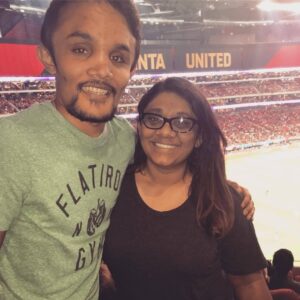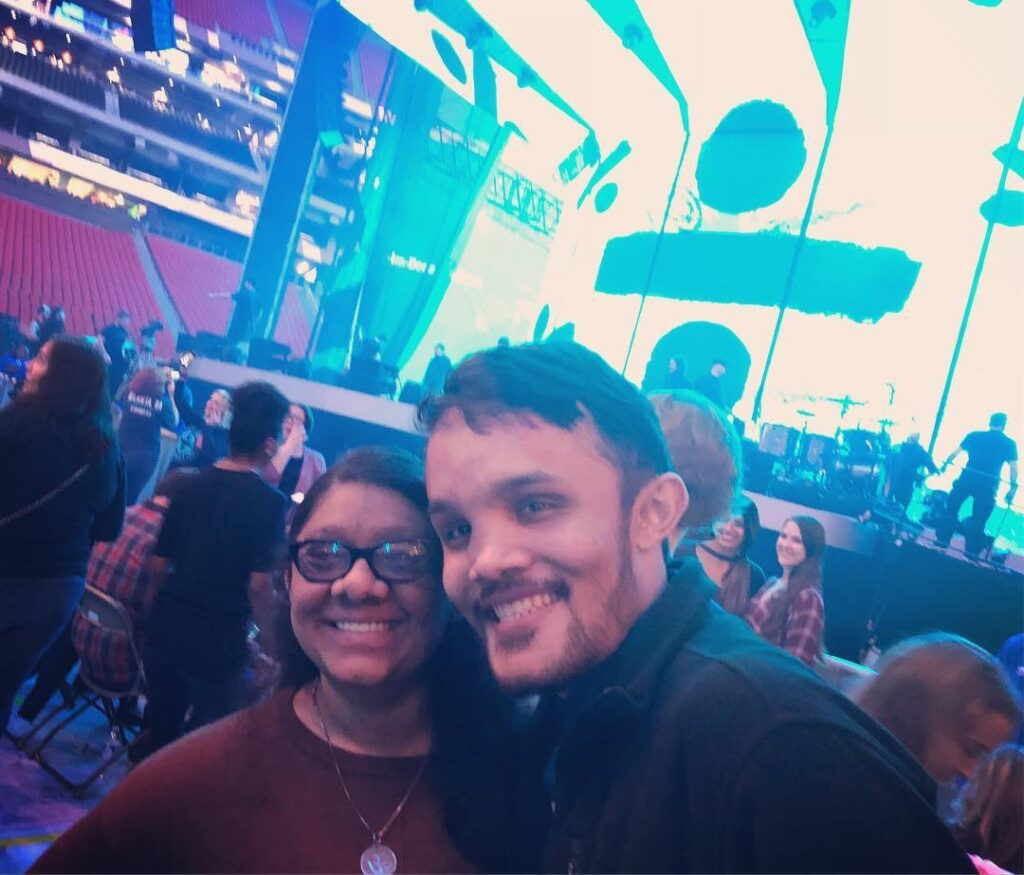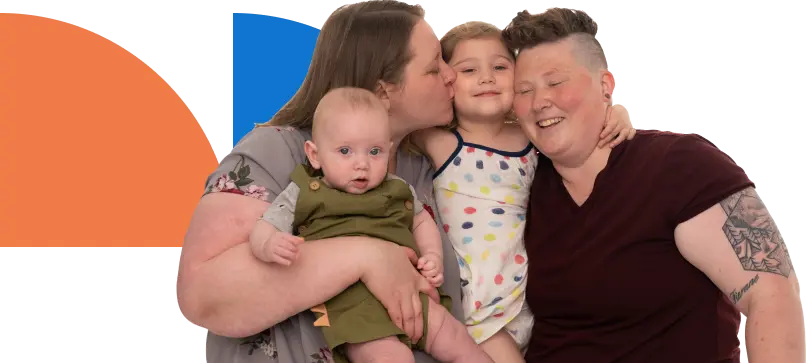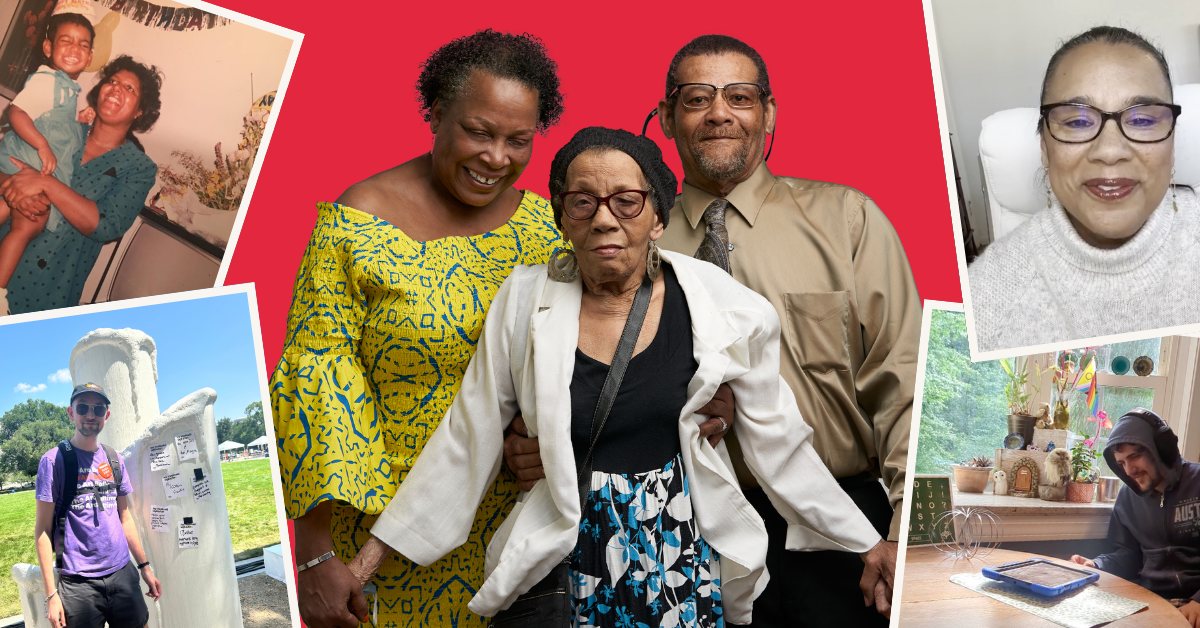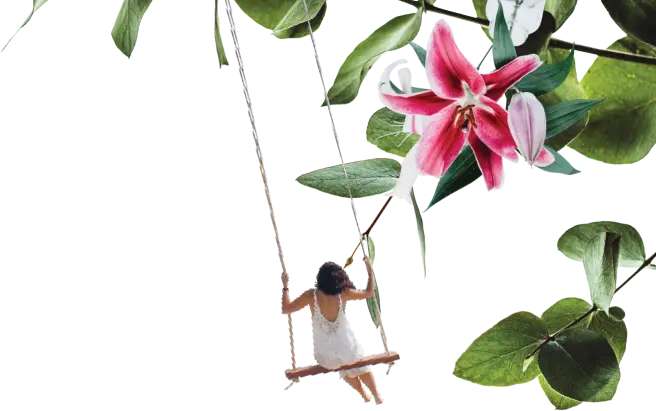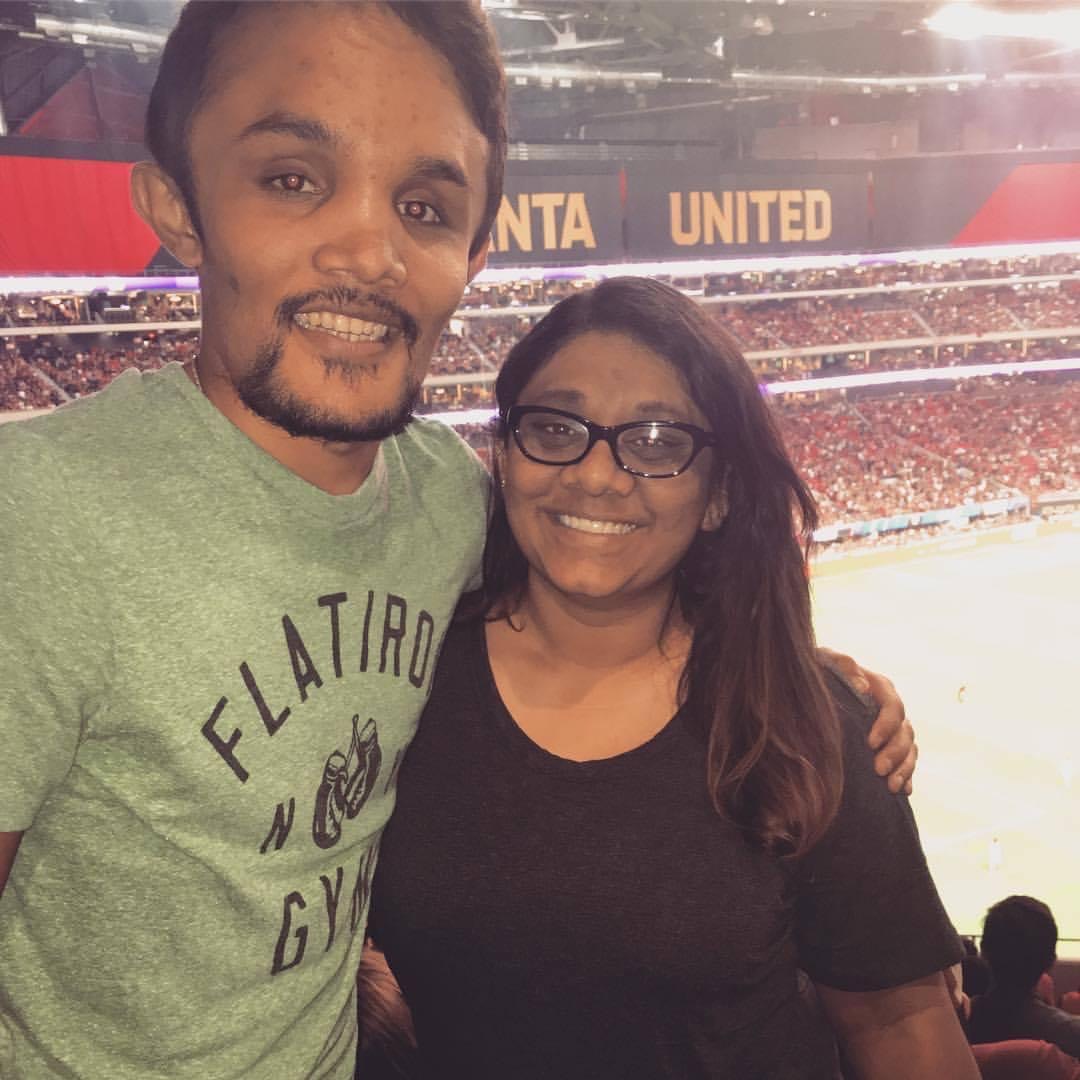
Happy National Siblings Day! To celebrate the day and siblings everywhere, we are highlighting a conversation from our partners at Sibling Transformation Project (STP), an organization that supports siblings of people with disabilities. The conversation features Quentin Monden, who is on the STP Organizing Committee, interviewing Mira Patel and her brother, Rahul Patel. Editor’s note: this interview has been reordered and condensed for readability.
Introductions
Quentin: Hello everyone! I am Quentin. Mira and I met in the 2020 cohort for the Sibling Transformation Project. I do some digital organizing and coaching for STP. We are going to spend this time getting to know you, Mira and Rahul. Can you give us a little background about yourselves?
Mira: You want to introduce yourself first?
Rahul: Hi, my name is Rahul Patel.
Mira: Anything else you want to say?
Rahul: No, that’s it.
Mira: So, my name is Mira. This is my brother. We’re about four and a half years apart. We’re both in Jonesboro, GA, which is right outside of Atlanta. I joined the Sibling Transformation Project when it was just a dream for Claire, our director. I met her at the Sibling Leadership Network Conference in 2019, which Rahul attended with me. So, he was there for the inception of STP. He was like a little cheerleader in the background, because he had to sit there with us for hours while we just went on and on, saying, “We want to do something! We don’t know what, but let’s do it. Let’s get it together!”
Sibling Dynamics and Interdependence
Quentin: So, thinking about the two of you, as brother and sister, what does your relationship normally look like? What kind of dynamic do you have, and how does it usually play out?
Mira: It plays out as me asking him to do stuff and him being like “Oh well, like I guess.” That’s how it plays out for the majority of the time.
Quentin: Do you agree with that, Rahul?
Rahul: Sometimes I just want to come home and just sit for a moment before I do anything.
Mira: I let you sit for a minute!
Quentin: So we’re seeing that there’s Mira’s version, and then there’s Rahul’s, and then there’s the truth in the middle somewhere. That’s funny though. I will try to advocate for Mira giving you a minute, Rahul. I will make that a point from now on.
Mira: Listen, all I’m asking you to do is help put the dishes in the dishwasher or help me put something away. It’s not like I’m asking you to do more than five minutes’ worth of stuff. You want me to make you food, but that’s going to take a minute, so you have to help me with that.
Quentin: So, in what ways do you – outside of the usual sibling dynamics, like older sibling versus younger sibling – feel more connected because of the nature of your relationship, as far as dealing with disability?
Mira: It may not feel like really that different, or is it? What do you think? What do you think about our relationship?
Rahul: We get into fights, but that’s normal. I mean, for the most part we’re good on a regular basis.
Mira: Sometimes, we have our squabbles. It is usually over something completely mundane, like you won’t help me load the dishwasher. Honestly, I think as we’ve become adults, our relationship has gotten better, because as kids there was a four-and-a-half-year age difference. That doesn’t seem like a lot, but it is for a kid, going through developmental milestones or just like typical things that kids go through. A 5-year-old is doing something completely different than a 9-year-old, right? And it was because we were going through those different stages that it felt like we weren’t close then. But now, it doesn’t seem like there’s too much of an age gap anymore. And our relationship has only gotten better as we’ve grown older, because now we’re at a place where despite that gap, we’re going through the same things.
Quentin: And with that, do you feel like the way you rely on each other has changed, now that you’re both like young adults? In what ways do you rely on each other now?
Mira: I rely on him for heavy lifting.
Rahul: Yeah, or reaching up on the shelf that she can’t reach because that’s a short people problem.
Mira: I’m short! And there are also other things that he’ll ask me for. He’s working at Costco now and he started back in August.
Rahul: The 18th of August.
Mira: Yeah, last year. And he needed help with filling out the application, and I was able to help him with that. He just got his forklift certification! He finds out all the cool stuff that’s coming into the store, and then lets us know so we can go buy it.
Rahul: Yeah, there are these heating blankets that were actually coming into our warehouse before they showed out, and I was like, “Mom, we should buy one of these!”
Mira: There are other things that he may ask me to do. He relies on me to make lunch for him every day, pretty much because I’m usually the one making it. There’s this mutual reliance on each other. For specific things, but also for emotional support.
Combating Ableism
Quentin: In what ways do you experience ableism, where you live or just in your everyday interactions?
Mira: Obviously ableism will always pop up in different ways. We are from an Indian background, and so when it comes to disabilities, a lot of it was always kind of hush hush. Like, “No, nothing’s wrong,” “Don’t say anything,” “Just keep it quiet.” It’s often just our immediate family who know what’s happening. Outside of them, it’s looked down on, or it’s hard to address it because someone’s going to say something very ableist. Particularly with my work with STP over the last couple years, I’ve become more aware of things that were happening that should have been addressed, but weren’t because of our cultural background.
Quentin: Yeah, I have faced the same challenge of the cultural element. But then it’s also just ignorance too – people not knowing any different, and not making the effort to find out, so it doesn’t really improve. More education may help. I am thankful that STP is anti-ableist and for all the wonderful resources we have from being a part of STP, and for the resources that we’re still creating. It makes conversations easier, and not even just conversations, but being able to model the way we want to interact with our siblings and just in general with people with intellectual or developmental disabilities.
Dealing with the Pandemic and STP’s Beginnings
Quentin: So, since we’re talking about the Sibling Transformation Project, it’s been two years since we came together and got to know each other. Thinking back to 2020, early in the pandemic and starting the first STP cohort, what was that time like for you?
Mira: It was overwhelming. Ttwo years ago, in early March, Rahul and my mom and dad went to India for three weeks. They left on March 9th, and slowly throughout that week, the news started getting more serious. They declared a pandemic. They shut down Italy. Countries were shutting down their borders. India was in the news at that point. I was constantly looking at my phone and watching TV. You couldn’t escape it – it was everywhere. I was afraid of them getting stuck there and I didn’t know when I’d see them again. They weren’t supposed to come back for another week, but I changed their tickets. I said, “Nope, I need you guys to come back.” They ended up leaving India on March 20th, which was literally the last flight out of India leaving to come back here.
Rahul: I remember this.
Quentin: Wow. The last flight – no way. Thankfully they came back before everything really shut down.
Mira: Two years ago, I remember STP was working on a planning meeting for the first cohort. I remember talking about how I was anxious. I relied on the team to help ease that anxiety, which they did, and I really appreciated that. As I became isolated – I wasn’t doing anything outside of going to work or the grocery store – STP was the only outlet I had. It was great to have that group to go to, because we were all in this isolated place.
Quentin: Yeah, it was great that the group, the early organizing committee and then the cohort, came together and were able to be there for each other. It was a really isolating time. We all had so much to look forward to during our cohort calls, because we could check in on each other. Just being able to connect with people when everything else was shut down was great, and especially with other siblings too. It was great to see other faces and hear other experiences. I’m glad that it was calming and supportive for you, especially during that time when you were dealing with so much with your family.
Hobbies
Quentin: So, on a lighter note, do you have any rituals or weekly rituals you both like to do together?
Rahul: We saw the Spiderman movie. I really wanted to see it. My sister has a Fire TV Stick, but we never wanted to watch it on there because it was a bootleg version. So I said, “Let’s go see it this Tuesday.” I had been waiting to watch it since it came out. It was still going.
Mira: We don’t have many specific rituals or things that we like to do together. We like going to sporting events, like soccer games. We’re big fans of the Atlanta United Soccer team. We do like to go to the movies. That’s usually one of those things that is a last-minute plan. The movie theater has a really good deal on Tuesdays, that used to be $5 movies on Tuesdays. Now it’s $7 with inflation but it’s still a good deal. On Tuesdays, especially before the pandemic, there was a good month where we were at the movie theater every Tuesday watching some movie. We loved to watch Marvel movies together. This most recent one is the only one that we haven’t seen on opening day since early on. But yeah, so movies are definitely something we like to do together. What else do we do?
Rahul: We used to go to soccer games. We went to a baseball game once. We went to the games a few times when my sister used to work for the hockey team.
Mira: We used to get free Hawks game tickets.
Rahul: The basketball team, so we went to a lot of those because they were free.
Mira: We go to a lot of concerts.
Rahul: But that’s like, something I get dragged into, yeah?
Mira: But you like it, yeah? You want to go too?
Rahul: Yeah, you’re right, I do If it’s somebody nice.
Mira: I don’t force you to go to these things. You want to come.
Rahul: Yeah, if it’s somebody nice. Concerts are a thing.
Mira: We used to love traveling. We haven’t done a lot of it recently, but we did a few trips, just the two of us or with a couple of friends. I think the last one was to California. We went to California back in 2018 for my birthday, on my 30th birthday. The only thing that seemed right to do was go to the happiest place on Earth, and go spend a week at Disneyland.
Rahul: Oh right, Disneyland! I keep forgetting.
Mira: We went to Seattle a few years ago as well. My aunt was getting married in Portland, and because Seattle and Portland are so close together, I decided, let’s go to Seattle. We got to see Seattle and then we both drove down to meet the family in Portland.
Rahul: We just haven’t gone in a while because all this is still going around. People say it’s gone or not gone. It makes some things hard to do. The day this goes away we should throw a party and everybody brings their mask and throws it into a fire pit and be like “Corona!” “No more mask!”
Quentin: I think a lot of people would take you up on that. I’m with you Rahul. I’ll definitely be ready to do that when we can finally put this behind us.
Rahul: Some people wear masks, some don’t. I still wear mine because of my parents.
Quentin: Yeah, I still wear mine too. I know the restrictions are loosening, but I’m still wearing it. Well thank you both for showing up this evening! We appreciate your time and getting to take a peek in your life as siblings. You guys have been great.
Mira Patel
Mira has served on the STP organizing committee from the start. She lives in Jonesboro, GA with her parents and younger brother. Mira is an alumna of our first cohort, and served as Cohort Coordinator for the 2021-22 group. Mira has worked in disability services providing access to community and employment services to people with disabilities for over 6 years. She holds a Master of Science in Human Services from Argosy University and certifications in job coaching and community employment. In her spare time, Mira loves traveling, concerts, and adding more books to her “to be read” pile than she can keep up with.
Rahul Patel
Rahul likes to describe himself as “just Rahul,” but he is in fact so much more than that. Rahul is Georgia born and raised and lives with his parents and sister in Jonesboro, GA, and is an avid Atlanta sports fan. Rahul likes to spend time with friends, try new restaurants, and play video games. Rahul has also been part of the STP family since its inception as he watched his sister and the original team brainstorm the ideas that later led to this program being created.
Quentin Monden
A preacher’s son, Quentin grew up in a home where mental health was never discussed. He presents to various groups and families about his depression, anxiety, and life after diagnosis. His time is currently divided between being a peer support facilitator for others with mental health disabilities and sitting on the NAMI Ohio Board of Directors and National Peer Leadership Council. He is also a certified practitioner of Profit from the Positive. Quentin is an alumnus of the first cohort of the Sibling Transformation Project, and then joined the Organizing Committee. He is on the communications committee and manages social media. He also is a graduate of Coaching for Healing Justice and Liberation and is part of STP’s coaching team.
